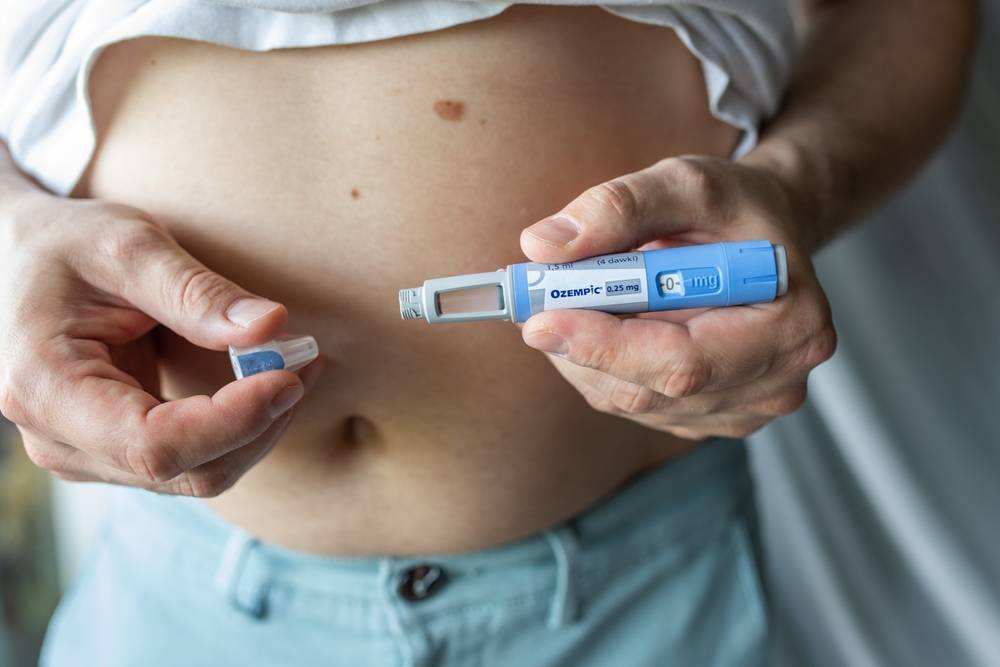Ozempic, or semaglutide injection is a once-weekly noninsulin medicine developed by Novo Nordisk which helps to improve blood sugar control in adults with type 2 diabetes.
Ozempic belongs to a class of medication known as glucagon-like-peptide-1 (GLP-1) agonists. They stimulate the secretion of insulin and slow the release of glucagon in your body, while slowing down your stomach’s movement so you feel full faster and longer, thus eating less and losing weight.

In June 2021, FDA formally approved Wegovy (another form of semaglutide) injection for the purpose of weight management in adults with obesity or overweight with at least one -weight-related condition (such as high blood pressure, type 2 diabetes or high cholesterol). It made to the news again in December 2022 when the FDA granted supplementary approval for its use “as an adjunct to a reduced calorie diet and increased physical activity for chronic weight management in paediatric patients aged 12 years and older with an initial BMI at the 95th percentile or greater standardized for age and sex (obesity)”. The company claimed that in a 68-week medical study of 1961 adults living with obesity or excess weight with a related medical problem, on average they achieved 15% weight loss of around 16 kg. A similar study on teens with age 12 to 17 has generated similar results.
Obesity is a major health issue worldwide. In the Asia Pacific region, the latest available data indicated that over 40.9% of adults and 10% of children are obese, similar to the world average. Recently, a Coca-Cola whistle-blower – a former consultant of the company told people that anti-diabetes drugs such as Ozempic, as set to make ‘lifetime’ patients out of children. Considering the high rate of obesity in the rich world today, it does raise an alarming bell. And we do recognize the fact that the company behind Wegovy and Ozempic can definitely benefit from this public health crisis. A simple check on Wegovy’s website makes us realize that this injection is indicated as a life-long treatment for obesity, with side effects ranging from pancreatitis, and gallbladder problems to kidney failure and heart conditions.
What big pharma fails to inform the public is that most obesity can be treated and managed with lifestyle changes. And despite the obesity crisis, big food companies continue to target teens as their main sale target thus making billions in profit. However immoral and unethical this arrangement may sound, there is not much government and social groups can do in a free market economy. As long as there are obesity and diabetes, big pharma and big food will continue to make profits.
So how can we change that? If you think you might be obese, measure your height and weight, put on this website and check. One simple solution to tackle both obesity and diabetes is to lose weight and control your blood sugar through lifestyle changes:
- Set realistic goals: Start by setting achievable and realistic weight loss goals. Aim for a gradual and steady weight loss of 2-3kg per month.
- Create a balanced and calorie-controlled diet: Focus on consuming a balanced diet that includes a variety of fruits, vegetables, whole grains, lean proteins, and healthy fats. Reduce or completely stop your intake of processed foods, sugary drinks, and foods high in saturated fats and added sugars. The food in restaurants and supermarket usually has calorie labels, check before consuming. Portion control is essential, so pay attention to your serving sizes and try to avoid mindless eating.
- Stay hydrated: Drink plenty of water throughout the day. Water can help you feel fuller and may reduce your overall calorie intake. Avoid calorie-laden beverages like soda, sweetened juices and energy drinks. Coffee and tea can also help with digestion and potentially lose weight.
- Practice mindful eating: Slow down and pay attention to your food while eating. Avoid distractions such as watching TV or using your phone. Mindful eating can help you recognize hunger and fullness cues, preventing overeating.
- Exercise: Incorporate regular exercise into your routine. Aim for a combination of cardiovascular exercises (such as walking, jogging, cycling, or swimming) and strength training exercises (like weightlifting or bodyweight exercises) to help build lean muscle mass. Healthy people should aim for at least 150 minutes of exercise per week. If you are already in the obese spectrum, aim more. Engage in activities you enjoy to make it easier to stick with your exercise plan.
- Make small, sustainable changes: Instead of making drastic changes all at once, focus on making small, sustainable adjustments to your lifestyle. For example, start by adding more vegetables to your meals, gradually increase your exercise duration or intensity or replace unhealthy snacks with healthier alternatives.
- Get adequate sleep: Aim for 7-9 hours of quality sleep each night. Lack of sleep can affect your hormone levels, leading to increased hunger and cravings for unhealthy foods.
- Manage stress: Find healthy ways to cope with stress, as emotional eating can sabotage weight loss efforts. Engage in stress-reducing activities like yoga, meditation, deep breathing exercises, or hobbies that you enjoy.
- Track your progress: Keep a record of your food intake, exercise routines, and weight loss progress. This can help you stay accountable and identify areas where you may need to make adjustments.
- Seek support: Consider seeking support from friends, and family, or joining a weight loss program or support group. Your doctors and many allied health professionals like dieticians, physiotherapists, and occupational therapists can all help you to plan. Having a support system can provide encouragement, motivation, and accountability.
Remember, however good Ozempic and Wegovy may sound in their marketing campaigns, they are medications that come with significant side effects. In most people, obesity and type 2 diabetes are not something that they are born with and are manageable through rigorous lifestyle changes. Medications should only be used as a last-line defence. All in all, who want to have monthly injections for the rest of their life?

